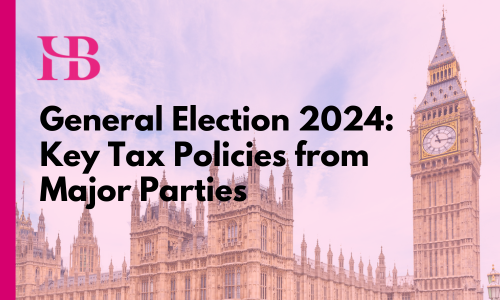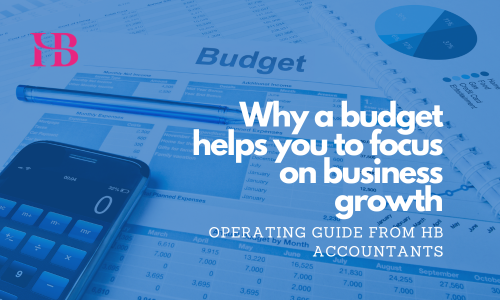HB Accountants has created a clear, impartial summary of the main tax policies proposed by major parties for the 2024 general election. This guide highlights the key tax changes each party plans, helping you understand the potential impact on businesses and individuals

A general election in the UK is being held on Thursdsay 4th July. Our guide highlights the key tax changes that each party plans to achieve. Our guide will help you stay informed about the potential impact on businesses and individuals alike.
Key Tax Policies in the 2024 General Election Table of Contents
The Conservative Party
The Green Party
The Labour Party
The Liberal Democrats
Plaid Cymru
The Reform Party
The Scottish National Party (SNP)
Conservative Party Tax Policies for the 2024 General Election
The Conservative Party has made several tax-related pledges for the upcoming 2024 general election. Here’s a summary of their key proposals:
- National Insurance Contributions (NIC) Reductions:
- Employees: The headline rate for employees’ class 1 NIC will decrease from 8% to 7% in April 2025, and further to 6% by April 2027
- Self-Employed: The main rate for class 4 NIC, currently at 6%, will be reduced by 1 percentage point each year starting in April 2025, with the goal of abolishing it completely by April 2029
- Age-Related Income Tax Personal Allowance:
- From April 2025, a new age-related income tax personal allowance will be introduced. This allowance will increase annually by the highest of prices, earnings, or 2.5%, ensuring it always exceeds the amount of the new state pension
- High Income Child Benefit Charge (HICBC) Reform:
- Starting April 2026, the HICBC will focus on household income rather than individual income. The clawback of child benefit will begin for households earning over £120,000, with the full amount clawed back at £160,000 or more.
- Stamp Duty Land Tax (SDLT) for First-Time Buyers:
- The increase in the SDLT threshold for first-time buyers in England and Northern Ireland will be made permanent, raising it from £300,000 to £425,000.
- Capital Gains Tax (CGT) Relief for Landlords:
- A two-year temporary CGT relief will be introduced for landlords who sell properties to their existing tenants.
This series of tax cuts is planned to be partially funded by measures to combat tax avoidance and evasion, which are reported to generate an additional £20 billion in tax receipts over five years.
The Conservative Party has outlined several areas where it won’t make changes. For instance:
- Pensions Tax Guarantee: The party commits to keeping the current income tax rules for pensions.
- Family Home Tax Guarantee: The party pledges to maintain the current capital gains tax (CGT) rules for residential properties.
- Tax Rates: They promise not to increase income tax or corporation tax rates.
Additionally, the party has a ten-point plan to support small and medium-sized enterprises (SMEs), which includes:
- VAT Threshold: Keeping the VAT threshold under review.
- Tax Incentives: Retaining key tax incentives like business asset disposal relief.
- R&D Tax Reliefs: Continuing support for research and development tax reliefs.
The Conservative Manifesto 2024
Green Party’s Tax Proposals: A Simple Breakdown
The Green Party plans to make several personal tax changes to raise between £50bn and £70bn per year. Here’s a simple summary:
For individuals:
- Wealth Tax: A new tax on assets over £10 million.
- Inheritance Tax (IHT): Reforms to close loopholes used by the super-rich.
- Capital Gains Tax (CGT): Aligning CGT rates with income tax rates.
- National Insurance Contributions (NIC): Applying the standard 8% rate to earnings over £50,270, instead of the current 2%.
- Pension Contributions: Fixing income tax relief at 20%.
For businesses:
- No Increase in Corporation Tax: The party won’t raise corporation tax but might introduce windfall taxes.
- Encouraging Decarbonization: Introducing a carbon tax to raise up to £80bn by the end of the parliament.
These changes aim to increase tax revenue and promote environmental sustainability.
For more information & The Green Party’s Manifesto click here
Labour Party’s Tax Plans: A Simple Overview
The Labour Party aims to reduce tax avoidance and close the tax gap. Here’s what they propose:
Modernising HMRC:
Invest £855 million to update HMRC.
Expect an additional £5.2 billion in tax receipts by 2028/29.
Close non-dom tax loopholes.
Increase registration and reporting requirements.
Strengthen HMRC’s powers.
Invest in new technology.
Focus on tax avoidance by large businesses and the wealthy.
Other Tax Measures:
Charge VAT on private school fees.
Tax carried interest as income.
Increase SDLT on residential property purchases by non-UK residents by 1 percentage point.
Close loopholes in the windfall tax on oil and gas companies.
No Increases to NIC, Income Tax, or VAT:
They promise not to raise National Insurance Contributions (NIC), income tax rates, or VAT.
Business Tax Policies:
Ensure certainty for businesses with one major fiscal event per year.
Publish a roadmap for business taxation for the next parliament.
Cap corporation tax at the current rate of 25%.
Keep key capital allowances, including full expensing and the annual investment allowance.
Provide greater clarity on what qualifies for allowances to improve business investment decisions.
These changes aim to make the tax system fairer and more efficient while providing stability and support for businesses.
Labour’s Plans to Close the Tax Gap
The Labour Party Manefesto 2024
Liberal Democrats’ 2024 Tax Plans: A Simple Overview
The Liberal Democrats have a “fair deal” plan to raise £26.9 billion by 2028-29 through ten tax policies, mainly targeting big businesses. Here’s a simple breakdown:
- Taxes on Big Businesses:
- Increase taxes on banks, water companies, oil and gas industries, the digital services sector, and the aviation industry.
- Capital Gains Tax (CGT) Reform:
- Raise the CGT annual exempt amount from £3,000 to £5,000.
- Introduce a tax-free allowance for inflation and a new relief for small businesses.
- Overall, CGT changes are expected to raise £5.2 billion by closing loopholes for the super-wealthy.
- Reducing the Tax Gap:
- Allocate £1 billion to HMRC to improve services and target tax evasion and avoidance.
- Aim to generate an additional £7.2 billion in tax receipts.
- Changes for Employers, Employees, and Freelancers:
- Review off-payroll working (IR35) reforms and employment rights.
- Establish a new ‘dependent contractor’ employment status.
- Increase the national minimum wage, especially for care workers.
- Reform statutory sick pay and expand parental leave and pay.
These proposals aim to make the tax system fairer and ensure big businesses and the wealthy pay their share.
Click here to see The Liberal Democrats’ 2024 Manefesto
Click here for The Liberal Democrats’ 2024 Manefesto Costing Summary
Click here to view The Liberal Democrats’ 2024 Reforming CGT to save our NHS
Plaid Cymru’s The Party of Wales’ Tax Proposals: A Brief Summary
Plaid Cymru wants the Senedd to control income tax bands and thresholds in Wales. Nationally, they propose:
- Increase Windfall Tax on oil and gas companies.
- Equalize CGT Rates with income tax.
- Introduce a Wealth Tax.
- Charge VAT on private school fees.
- Crack Down on tax evasion and abolish non-dom loopholes.
- Increase NIC Rates for high earners.
- Raise Income Tax Personal Allowance for pensioners.
These measures aim to ensure fairness and enhance revenue.
Click here for the Plaid Cymru’s The Party of Wales’ 2024 Manefesto
Reform Party’s Tax Proposals: A Quick Summary
The Reform Party aims to simplify and cut taxes, focusing on benefiting individuals:
- Income Tax: Raise the personal allowance to £20,000 and the 40% tax threshold to £70,000.
- Inheritance Tax (IHT): Abolish IHT on estates under £2 million.
- Stamp Duty Land Tax (SDLT): Make significant cuts.
- VAT: Remove VAT on household energy bills.
For businesses:
- Corporation Tax: Reduce the main rate from 25% to 20%, and then to 15%.
- VAT Registration Threshold: Increase from £90,000 to £150,000 to ease burdens on small entrepreneurs.
- Employers’ NIC: Increase from 13.8% to 20% for foreign workers, with some exceptions.
These changes aim to make the tax system simpler and more beneficial for both individuals and businesses.
The Reform Party’s Manefesto 2024
Scottish National Party (SNP) Tax Proposals: A Simple Overview
The SNP seeks full control over tax powers, including:
- NIC Devolution: Align NIC rates and thresholds with Scottish income tax.
- VAT Reforms: Address imbalances, like taxing sunscreen but not caviar.
- Hospitality and Tourism: Introduce a lower VAT rate.
- Electric Vehicles: Remove VAT from on-street charging.
These measures aim to tailor tax policies to better suit Scotland’s needs.
The SNP Manifesto 2024
We would like to thank the ICAEW’s Tax Faculty for some of the information contained within this blog post.
HB Accountants are here to provide expert guidance and support to businesses and individuals alike. Feel free to get in touch with us here
The information contained above is for general guidance purposes only. Whilst every effort has been made to ensure the contents are accurate, please note that each individual has different circumstances and it is essential that you seek appropriate professional advice before you act on any of the information contained herein. HB Accountants can accept no liability for any error.
Read our latest blogs below
- HMRC Advisory Fuel Rates (AFRs) from 1st June 2025
 HMRC has published the latest Advisory Fuel Rates (AFRs) which apply from 1 June 2025. AFRs are the official rates used when reimbursing employees for business mileage in company cars. They’re reviewed … Continue reading
HMRC has published the latest Advisory Fuel Rates (AFRs) which apply from 1 June 2025. AFRs are the official rates used when reimbursing employees for business mileage in company cars. They’re reviewed … Continue reading - How an audit can help your business (and actions you can take to make it go smoothly too!)
 An audit may be a legal requirement for your business but a well managed audit can also boost your business growth and ensure that it is operating in the best way possible.
An audit may be a legal requirement for your business but a well managed audit can also boost your business growth and ensure that it is operating in the best way possible. - Why a budget helps you to focus on business growth
 Are you looking for clarity over the future direction of your business? Do you want to know the actions you should take in order to grow your business? Then consider taking time … Continue reading
Are you looking for clarity over the future direction of your business? Do you want to know the actions you should take in order to grow your business? Then consider taking time … Continue reading - How a SME Owner Can Create More Time
 SME owners and managers – are you part of the one in five small and medium-size enterprise managers that work on average an additional 3 hours a day on a regular basis? … Continue reading
SME owners and managers – are you part of the one in five small and medium-size enterprise managers that work on average an additional 3 hours a day on a regular basis? … Continue reading - A New Academic Year for our Student in Zambia
 As the new academic year unfolds in Zambia, we are delighted to share an update about our sponsored student, Getrude. Currently in her second year at Chalimbana University, Gertrude is studying Business … Continue reading
As the new academic year unfolds in Zambia, we are delighted to share an update about our sponsored student, Getrude. Currently in her second year at Chalimbana University, Gertrude is studying Business … Continue reading

